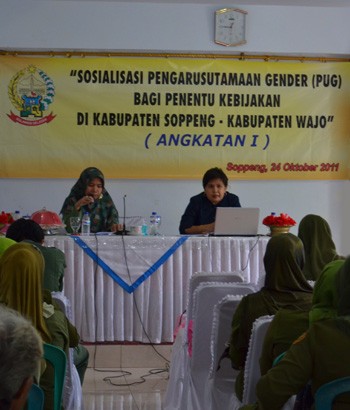The Indonesian government has come a long way when it comes to legislating for gender mainstreaming, but not enough has changed in terms of development practice
Nurul Ilmi Idrus
 |
Mostly women attend a meeting at the Bureau for the Empowerment of Women and Family PlanningKoleksi Badan Pemberdayaan Perempuan dan Keluarga Berencana, Provinsi Sulawesi Selatan |
The term ‘gender’ has become part of the every day vocabulary of Indonesian policy-makers. But most of them don’t really know what it means. When they talk about gender mainstreaming in development, they usually mean some kind of women’s empowerment initiative. As a result, gender mainstreaming tends to be thought of in terms of programs for women. This approach results in the establishment of separate programs or a dedicated component for women in a broader project. This ‘add women and stir’ method is a long-established one in the international development community, but one whose time is long gone.
The gender mainstreaming approach recognises that both women and men benefit from the systematic inclusion of a gender perspective in planning, implementation, monitoring and evaluation of development policies and programs. In theory, it is very different from women’s empowerment programs in terms of its scope, the actors involved, and its impact. In terms of its scope, the women’s empowerment programs of the past were very much at the periphery, while gender mainstreaming is positioned at the centre. In terms of actors, all bureaucrats at











